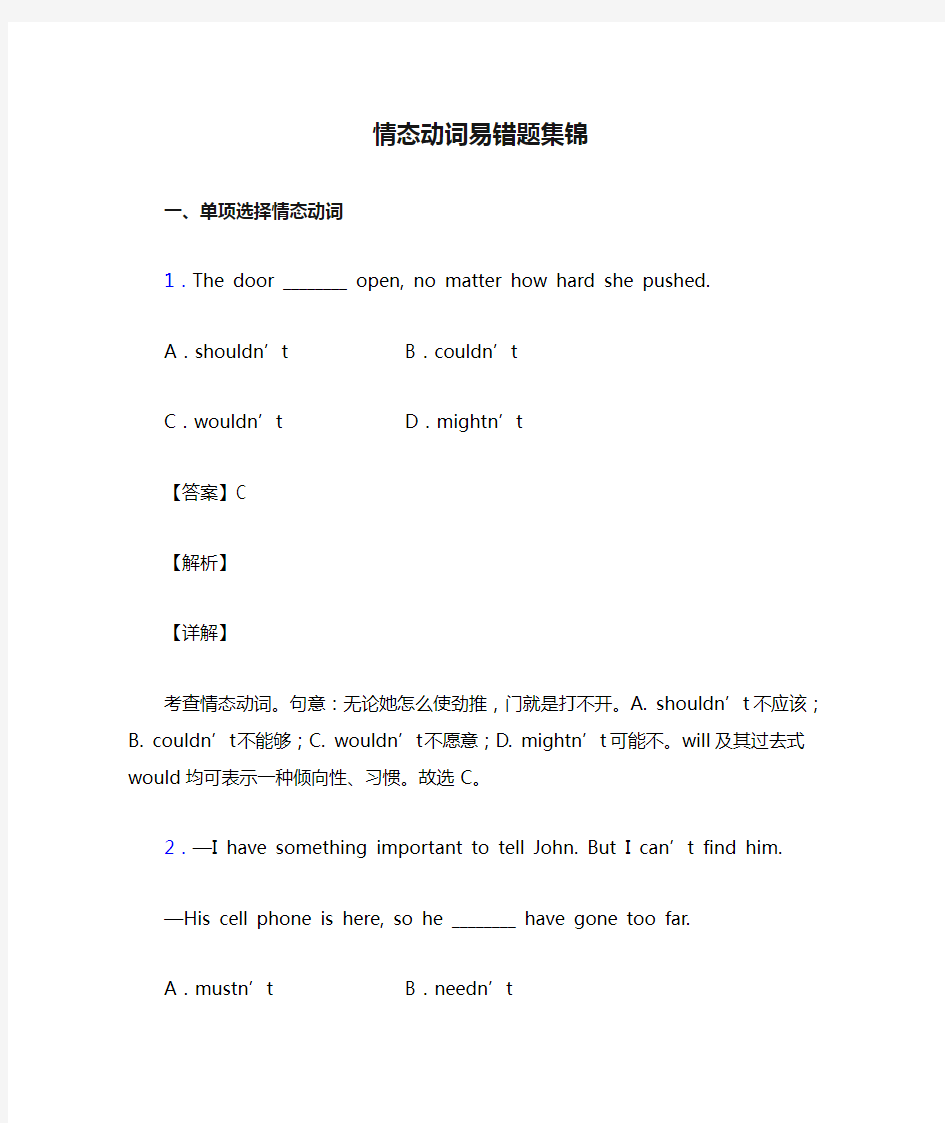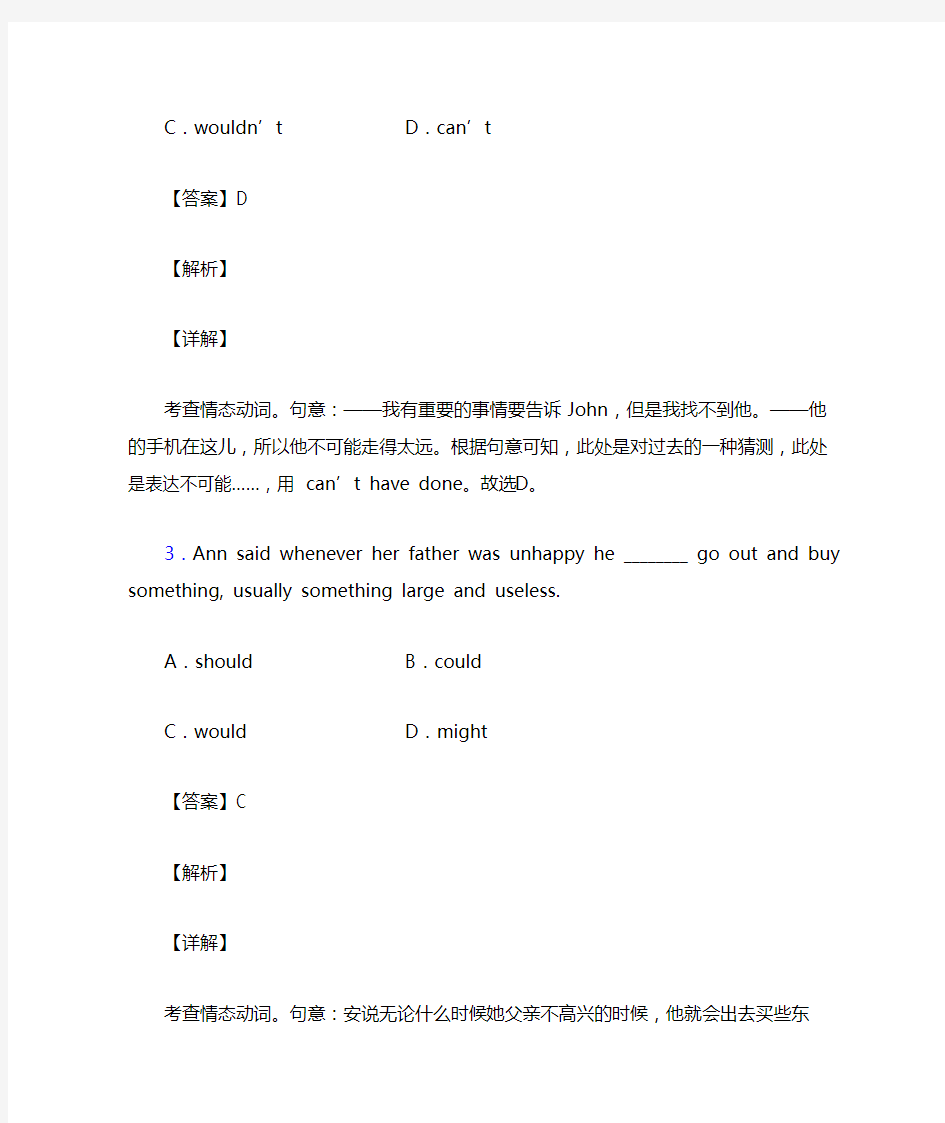情态动词易错题集锦


情态动词易错题集锦
一、单项选择情态动词
1.The door ________ open, no matter how hard she pushed.
A.shouldn’t B.couldn’t
C.wouldn’t D.mightn’t
【答案】C
【解析】
【详解】
考查情态动词。句意:无论她怎么使劲推,门就是打不开。A. shouldn’t不应该;B. couldn’t 不能够;C. wouldn’t不愿意;D. mightn’t可能不。will及其过去式would均可表示一种倾向性、习惯。故选C。
2.—I have something important to tell John. But I can’t find him.
—His cell phone is here, so he ________ have gone too far.
A.mustn’t B.needn’t
C.wouldn’t D.can’t
【答案】D
【解析】
【详解】
考查情态动词。句意:——我有重要的事情要告诉John,但是我找不到他。——他的手机在这儿,所以他不可能走得太远。根据句意可知,此处是对过去的一种猜测,此处是表达不可能……,用can’t have done。故选D。
3.Ann said whenever her father was unhappy he ________ go out and buy something, usually something large and useless.
A.should B.could
C.would D.might
【答案】C
【解析】
【详解】
考查情态动词。句意:安说无论什么时候她父亲不高兴的时候,他就会出去买些东西,通常是一些又大又没用的东西。A. should应该;B. could能;C. would总是,愿意;D. might 可能。此处表示过去经常习惯做某事,故选C。
4.It has been announced that all the candidates ___________ remain in their seats until all the papers have been collected.
A.shall B.could
C.would D.ought
【答案】A
【解析】
【详解】
考查情态动词用法。句意:据宣布,所有的候选人都要坐在位置上,直到所有的试卷都被收齐。根据句意可知本句是考试规则,情态动词shall可以表示“按照规则/规定/法律要做的事情”,符合本句语境。故A项正确。
5.—It’s really great to have a computer to store my photos.
—Don’t count on it too much. It ________ break down and you’d better make a copy of them. A.must B.can
C.should D.will
【答案】B
【解析】
【详解】
考查情态动词。句意:——有一台计算机来储存照片真是太棒了。——不要过度依赖它。它有时候也会出故障,你最好做一个备份。计算机出故障这是可能的事情,表示客观可能性用can。must肯定,必须;should应该;will表意愿。故B选项正确。
6.It wasn’t right to me that such near neighbors not know one another.
A.could B.would
C.should D.might
【答案】C
【解析】
【详解】
考查情态动词。句意:对我来说,很不正常,如此近的邻居居然不认识。A. could可能,能够;B. would将;C. should竟然;D. might可能,也许。should 作为情态动词,可以用来表示意外、惊喜或者在说话人看来是不可思议的,常常译为"竟会"、"居然",住的这么近的邻居居然不认识。表示意外,所以答案选C。
【点睛】
should的用法
1、should 作为情态动词,通常用来表示现在或将来的责任或义务,译作“应该”、“应当”,这时它可以和 ought to, be supposed to 互换使用.例如:You should (= ought to ) tell your mother about it at once.
2、should 作为情态动词,可以用在条件状语从句中,表示语气较强的假设,译作“万一”、“竟然”,这时也可将 should 置于从句之首,即将 should 放在主语前面,而省略从属连词 if。例如:If you should fail to come, ask Mrs Chen to work in your place. (= Should you fail to come, ask Mrs Chen to work in your place. )
3、should 作为情态动词,可以表示谦逊、客气、委婉之意,译为“可……”、“倒……”。例如:I should say that it would be better to try it again.
4、should 作为情态动词,可以用来表示意外、惊喜或者在说话人看来是不可思议的.尤其在
以 why, who, how 等开头的修辞疑问句或某些感叹句中常常译为“竟会”、“居然”。例如:How should I know it ? 我怎么会知道这件事?
5、should 作为情态动词,可以用来表示有较大可能实现的猜测、推论,通常译为“可能”、“总该……吧”,相当于 be expected to 。例如:They should be home by now, I think. 我想现在他们总该到家了吧。
6、should 作为情态动词,用在由 so that, for fear that, lest 引导的目的状语从句和 in case (that)引导的条件状语从句中,有“能够”、“可能”、“会”之意。例如:They got up early so that they should (= could/ might) catch the first bus in time.
7、should 作为情态动词,可以用于下列虚拟语气句中:
(1)用在表示与将来事实相反的条件状语从句中,构成“ If …… should (do sth)……, …… would/ could/ might (do sth.)…… ”句式。
(2) 用在 suggest (propose), arrange, plan, decide, advise, order, demand, request, desire, insist 等表示“建议”、“要求”、“命令”、“决定”、“安排”、“计划”、“主张”的动词后面接的宾语从句中。这里的 should 也可以省略。
本句中should 作为情态动词,可以用来表示意外、惊喜或者在说话人看来是不可思议的,常常译为"竟会"、"居然",住的这么近的邻居居然不认识。表示意外,所以答案选C。
7.It_____ have been Tom that parked the car here, as he is the only one with a car.
A.may B.can C.must D.should
【答案】C
【解析】
【详解】
考查情态动词表猜测的用法。句意:一定是汤姆把车停在这儿的,因为他是唯一有车的人。A. may可能;B. can可能;C. must一定;D. should应该。由as he is the only one with a car.可知一定是他把车停在这里的,非常有把握的肯定推测,故选C。
8.—______ you sing and dance at this late hour of the night?
—Sorry, I will stop right now.
A.May B.Shall
C.Will D.Must
【答案】D
【解析】
试题分析:考查情态动词的用法。 May可以,可能 Shall: 用于第一三人称的疑问句,表示说话人征求对方的意见或向对方请示。?用于二三人称的陈述句表示说话人给对方的命令、警告、允诺、威胁或决心等。?用于法律、法规条文、合同等,按规定应该履行的义务等。Will 表示请求或建议;表示意愿或表示现在的习惯D. Must表示“必须”“一定”“偏要”之意。此处must表示“偏要,偏偏”。句意:——你偏要在深夜又唱又跳吗?——很抱歉,我会马上停止。
考点:考查情态动词的用法。
9.—Daddy, would you please buy me an iPhoneX?
—If you can pass this midterm examination, you __________ have one as a reward.
A.must B.need
C.would D.shall
【答案】D
【解析】
【详解】
考查情态动词。句意:爸爸,你可以给我买部iPhone X吗?--如果你通过考试,你就会得到一部作为奖励。A. must一定;B. need必要;C. would将,会;D. shall会。根据语境可知,这句话是父亲对子女的允诺,故选D。
【点睛】
shall的用法。
1. shall作为助动词,一般用于第一人称Ⅰ和We,表示一个将来的动作,构成将来时态。shall后面接动词原形。例如:
(1)I shall think it over and Let you know my idea.我将考虑一下此事,然后告诉你我的想法。
(2)We shall have a good time in the park.我们在公园里会玩得很高兴的。
2. shall用于第一人称,表示征求对方的意愿。如:What shall we do this evening?
3. shall用于第一、第三人称疑问句中,表示说话人征求对方的意见或向对方请示。如:Shall we begin our lesson? When shall he be able to leave the hospital?
4. shall用于第二、第三人称,表示说话人给对方命令、警告、允诺或威胁。如:You shall fail if you don't work harder. (警告) He shall have the book when I finish reading. (允诺)He shall be punished. (威胁)
比如本题,根据语境可知,这句话是父亲对子女的允诺,故选D。
10.—Can I pay the bill by check?
—Sorry,sir.But it is the management rules of our hotel that payment _____ be made in cash.
A.shall B.need
C.will D.can
【答案】A
【解析】
【详解】
考察情态动词用法。句意:——我能用支票付账吗?——对不起,先生。但这是我们酒店的管理规定,支付要用现金。shall可以表示命令,警告,强制,或者指规则和法律要求做的事情。本题正是考察了shall表示按照规则和法律要求做的事情。故A正确。
11.—You rang me up at about 10:00 last night, didn't you?
—No, I didn't phone you. It someone else.
A.must have been B.could be C.must be D.could have been 【答案】A
【解析】
【详解】
考查情态动词+have done。句意:“昨晚10点左右你给我打了电话,是吗?”“不,我没给你打电话。一定是别人干的。” must have done 是对过去发生的动作最有把握的猜测,意思是“一定”,结合语境可知,我没有打电话给你,因此猜测一定有别人给你打了电话。故选A 项。
12.—_______ you disturb me now? I’m busy preparing a report.
— Terribly sorry, but I have something urgent to tell you.
A.Need B.Should C.Might D.Must
【答案】D
【解析】
【详解】
考查情态动词特殊用法。句意:—你非要现在打扰我吗?我正在准备一份报告。—真对不起,但是我怕有紧急事情告诉你。A. Need需要;B. Should 应该;C. Might也许;D. Must 必须;一定;偏偏,非得;根据语境可知must表示“偏偏,非得”符合上下文语境,用来指责对方。故D项正确。
13.Students ____ remain in their seats until all the papers have been collected according to the regulation.
A.would B.shall C.will D.could
【答案】B
【解析】
【详解】
考查情态动词。句意:学生们必须呆在自己的座位上,直到所有的试卷都被收回。根据句意,“学生们呆在自己的座位上”是一项规定。shall 可表示某种规定或义务,用于第二、三人称的句子中。而其他情态动词无此用法。故正确答案为B。
14.Using AI, many companies are now conducting experiments that__________ possible just a few years ago.
A.would have been B.might have been
C.shouldn't have been D.couldn't have been
【答案】D
【解析】
【详解】
考查情态动词表推测。句意:很多公司现在使用人工智能进行试验,这在几年前是不可能
的。根据“a few years ago”可知,此处表示“过去不可能”,应该用couldn’t have done,故D 项正确。
15.—Where is my dictionary?I remember I put it here yesterday.
—You___it in the wrong place.
A.must put B.should have put
C.might put D.might have put
【答案】D
【解析】
【详解】
考查情态动词。句意:——我的词典在哪里?我记得昨天放在这里了。——你或许放错了地方。“might have +动词+ed形式”表示过去可能完成的动作。根据所提供的情景Where is my dictionary? I remember I put it here yesterday.可判断出把词典放在某个地方发生在过去,所以要用“might have +动词+ed形式”。“should have + 动词+ed形式”表示“(过去)本来应该做某事”。must意为“一定”,是肯定的推测,与所提供的情景的矛盾。might put表示现在发生的事。故选D。
16.We’ll make the final decision on our scheme. ______ you change your mind, please inform us as soon as possible.
A.Should B.Were C.Would D.Had
【答案】A
【解析】
【分析】
【详解】
考查虚拟语气。句意:我们将对我们的计划做最后决定。如果你改变主意,请尽快通知我们。根据语境,此处用虚拟语气,表示与将来相反,从句用should+动词原形,省略if,should提前,陈述句是:If you should change your mind……。故选A。
【点睛】
虚拟语气中的倒装
当虚拟条件句中含有 were,had,should时,可以将if省略,然后将 were,had,should,移至句首:
1)If he should fail, he would kill himself.
→Should he fail, he wou ld kill himself.
万一失败,他就会自杀。
2)If I were you, I would do it at once.
→Were I you, I would do it at once.
假若我是你,我就会马上做。
要是我能做此事,我一定会做。
3)If he had seen you yesterday, he would have asked you about it.
→Had he seen you yesterday, he would have asked you about it.
他昨天要是看到了你,他就会问你这事了。
该小题属于上述的第一种情况。should作为情态动词,有一种特殊的用法:在虚拟条件状语从句中表示与将来事实相反的虚拟语气,可以把should放在句首,即主语前,从而省略从属连词if。原来的表述为:If you should change your mind。故选A。
17.While it wasn’t the goal of the trip, I was rewarded with fresh insights, ones that ________ to me during the regular course of business.
A.might never happen B.could never have happened
C.should not happen D.needn’t have happened
【答案】B
【解析】
【详解】
考查虚拟语气。句意:虽然这并不是这次旅行的目的,但我得到了一些新的领悟,那些领悟在我的日常生活中是本不可能发生的。此处考查虚拟语气,“我得到新的领悟”发生在过去,故此处是与过去事实相反,应用could/might/would/need/should+have done,“本不可能发生”是could never have happened,故选B项。
【点睛】
本题考查“情态动词+have done”的虚拟语气,其常用表达有:
could have done本能做某事而未做couldn’t have done不可能做了某事
should have done本应该做某事而未做 s houldn’t have done本不应该做某事而做了would have done本会某事而未做wouldn’t have done本不会做某事而做了
need have done本需要做某事而未做needn’t have done本不必要做某事而做了
18.—Sorry, Mum! I failed the job interview again.
—Oh, it's too bad. You________ have made full preparations.
A.must B.can C.would D.should
【答案】D
【解析】
【详解】
考查情态动词+have done结构。句意:—对不起,妈妈,我面试又失败了。—噢,那太糟糕了,你应该做好充分准备的。A.must必须;B.can可以;C.would将会;D.should应该。这里是情态+have done的结构的虚拟语气,can+have+done”表示对过去行为的怀疑,用于疑问句,译成“可能做过……吗?”;could+have+done,表示对过去事情的假设,意思是本来能够做某事而没有做;must+h ave+done”表示对过去事情的肯定推测,译成“一定做过某事”,该结构只用于肯定句;should+have+done意思是“本来应该做某事,而实际没做”。故选D
【名师点睛】
情态动词是一种本身有一定的词义,表示说话人的情绪、态度或语气的动词,但它不能单独作谓语,只能和其他动词一起构成谓语。情态动词是每年高考的热点也是难点,每年单项填空题必考一题。考点集中在:情态动词表示推测的基本用法及区别,情态动词否定式的用法辨析,“情态动词+have done”的用法区别等。
19.AI will surely be a feature of future life, but it _____ be used responsibly and in a proper way. A.can B.need C.must D.will
【答案】C
【解析】
【详解】
考查情态动词。句意:人工智能肯定会成为未来生活的一个特征,但必须以负责任的方式和适当的方式使用它。A. can能够;B. need需要;C. must必须;D. will将会。此处为情态动词的一般用法,结合句意表示“必须”,故选C。
20.—It’s so hot and uncomfortable here! Why are your windows still closed?
—Oh, I’m not to blame. They ________ open.
A.shan’t B.mustn’t C.won’t D.wouldn’t
【答案】C
【解析】
【详解】
考查情态动词辨析。句意:---这里又热又不舒服!你的窗户怎么还关着? ---哦,不该责备我啊。窗户打不开了。shan’t= shall not意为“不可, 不应”;mustn’t=must not意为“不要”;wouldn't=would not 意为“不会,不愿意”。won’t=will not意为“不会, 不能”, will在这里表
示能力、功能。例如:This auditorium will seat one thousand people. 这个礼堂能容纳一千人。这句话意思是“这扇窗不能打开”,故选C项。
21.–Will you read me a story, Mummy?
--OK. You ______have one if you go to bed as soon as possible.
A.might B.must C.could D.shall
【答案】D
【解析】
【分析】
【详解】
考查情态动词。句意:——妈妈,给我讲个故事好吗?——好,如果你尽快上床睡觉,我
就给你讲一个。might表示“或许”;must表示“必须”;could表示“可能”;shall在此处表示“允诺”,符合句意,故选择D项。
22.He _____ his stay in France, didn't he? He looks amazingly different.
A.will have enjoyed B.should have enjoyed
C.can have enjoyed D.must have enjoyed
【答案】D
【解析】
【详解】
考查情态动词+have done。句意:他在法国一定过得很愉快,是吗?他看起来很不一样。must have done一定做某事。表示对过去事情的较有把握的推测。由“ He looks amazingly different.”可知,他在法国一定过得很愉快。所以这是对过去事情的较有把握的推测。故选D项。
23.We ______ ha ve watered these flowers yesterday. Today’s rain will be too much for them. A.can’t B.shouldn’t C.may not D.mustn’t
【答案】B
【解析】
【详解】
考查情态动词。句意:我们昨天不应该给这些花浇水。今天的雨对他们来说太大了。A. can’t不可能;B. shouldn’t不应该;C. may not或许不会;D. mustn’t禁止,不允许。情态动词的完成时should’t have done“本不应该做而做了”。根据Today’s rain will be too much for them.可知,此处指昨天不应该给这些花浇水。故选B。
【点睛】
情态动词+ have done结构:
1.“must + have + 过去分词”表示对过去发生的事情或状态进行推测,语气比较坚定,通常只用于肯定句。如:It must have rained last night, for the ground is wet.
2.“can / could + have + 过去分词”表示对过去某种情况的怀疑或不确定。can和could一般用于否定句和疑问句,could的语气较can弱。如:He can't have finished the work so soon.
3.“may / might + have + 过去分词”表示对已发生的动作或存在的状态进行不肯定的推
测,might的语气比may弱一点.这种结构主要用于肯定句和否定句,疑问句改用can或could,如:They may not have known it beforehand.
4.“need + have + 过去分词”表示过去做了不必做或不需要做的事情,或过去做某事纯属多余,如:I needn't have bought so much wine—only five people came.
5.“should / ought to + have + 过去分词”表示过去本该做某事但没做,其否定式表示过去不该做某事但做了,这种句式含有不满或责备之意,ought to的语气比should强一些。如:You ought to / should have studied harder.你本应该更努力学习的。(但没有)
He oughtn't to / shouldn't have done that.他本来就不该做那件事。(可是做了)
6.“would + have + 过去分词”表示对过去的某种情况进行猜测,或本来要做某事却因某种原因未做成,通常用来说明某一情况,但不像用should或ought to那样含有责备之意。如:I guess the poet would have been about twenty when she wrote her first poem.
Another worker wouldn't have acted like that.
24.—Life ____ be very hard for people living in the north of Canada as it is very cold there in winter.
—Yes, the weather there _____ be as low as 60℃ below zero.
A.must; can B.shall; must C.will; should D.has to; can
【答案】A
【解析】
【详解】
考查情态动词。根据句意:——对于生活在加拿大北方的人来说生活肯定很艰难,因为冬天那儿很冷。——是的,那儿的天气可能会达到零下60度。must表肯定推测,意为“肯定,一定”,can表客观上的可能性,意为“可能”。根据语境及选项可知,A选项正确。故选A。
25.—What do you think we can do for our aged parents?
—You ______ do anything except to be with them.
A.don’t have to B.oughtn’t to C.mustn’t D.can’t
【答案】A
【解析】
【详解】
考查情态动词辨析。句意:——你认为我们能为年迈的父母做些什么?——除了和他们在一起,你不必做任何事情。A. don’t have to不必;B. oughtn’t to不应该;C. mustn’t不可以;D. can’t不能。根据语境可知,此处表示客观性的必须,don’t have to…except to“除了……不必做……”。故选A。
【点睛】
have to表示客观需求时,使用have to的情况要比must多。have to受客观条件或环境迫使而“不得不”做某事,突出客观性。
must一般则表示命令或说话人主观认为必须要做某事,含强调语气,侧重主观性。有时候也使用be+不定式表示需要做某事,但语气较弱一些。如:I am to do it, whether I like it or not.
must表示客观性的需要时,一般翻译为“总是要(会)”。如:All men must die. 人故有一死。
ought to表示必须时,偏责任,推想等。如:You ought to work hard.
26.Tom, you _____ leave all your clothes on the floor like this!
A.wouldn’t B.mustn’t C.needn’t D.may not
【答案】B
【解析】
【详解】
考查情态动词辨析。句意:汤姆,你不要把所有的衣服都这样扔在地板上! A. wouldn’t 不
会; B. mustn’t 禁止;C. needn’t不需要;D. may not不可以。本句为祈使句,所以mustn’t “禁止”符合句意。故选B项。
27.One of the few things you ___ say about English people with certainty is that they talk a lot about the weather.
A.need B.must C.should D.can
【答案】D
【解析】
【详解】
考查情态动词的用法。句意:关于英国人你可以肯定的一点是他们谈论很多的天气。A. need需要;B. must必须;C. should表示责任和义务;D. can可以;能够。根据语境,故选D。
28.—What does the sign over there read?
—“No person___smoke or carry a lighted cigarette,cigar or pipe in this area.”
A.will B.may
C.shall D.must
【答案】C
【解析】
【详解】
考查情态动词辨析。句意:---那边的牌子上写的是什么?---任何人不得在本地区吸烟或携带点燃的香烟、雪茄或烟斗。A. will表示现在的意志、愿望等,意为要,希望; B. may表示许可,或用于请求许可,意为可,可以;C. shall在陈述句中用于第二人称或第三人称,表示说话者的意志、命令、约定、决心、警告、威胁、预言等,意为必须,应该,要,得,给; D. must意为必须, 要,应当。分析句意可知,词句表示任何都不准在这个区域吸烟或携带点着的香烟、雪茄或烟斗。故选C项。
29.(2018·天津) I can't find my purse. I___________ it in the supermarket yesterday, but I'm not sure.
A.should leave B.must have left
C.might leave D.could have left
【答案】D
【解析】
【详解】
考查情态动词表推测。句意:我不能找到我的钱包了,昨天我有可能把它落到超市了,但我不确定。根据句中时间状语yesterday可知,是对过去事情的推测,故用情态动词+ have done,再根据后句but I’m not sure.可知,此推测为不能肯定的推测,故用情态动词could,表示“可能”。故选D。
【点睛】
情态动词是每年高考的热点也是难点。本题抓住两点:第一、时态。根据句中时间状语可以判断出是对过去事情的推测,故用情态动词 + have done;如果是对现在事情的推测,才用情态动词+v原形。第二、情态动词的选择。must为肯定推测,表示“一定”,could为不肯定推测,表示“可能”,这样就能选出正确答案。
30.-–Mary knows the city quite well.
--She______ well have been there before.
A.need B.could C.should D.may
【答案】D
【解析】
【分析】【详解】
考查情态动词辨析。句意:——Mary非常了解这个城市。——她肯定以前在那里呆过。may have done过去可能做过某事。表示对过去的肯定猜测。need have done本需要做某事却没做;could have done本可以做某事却没做;should have done本应该做某事却没做。故选D。
